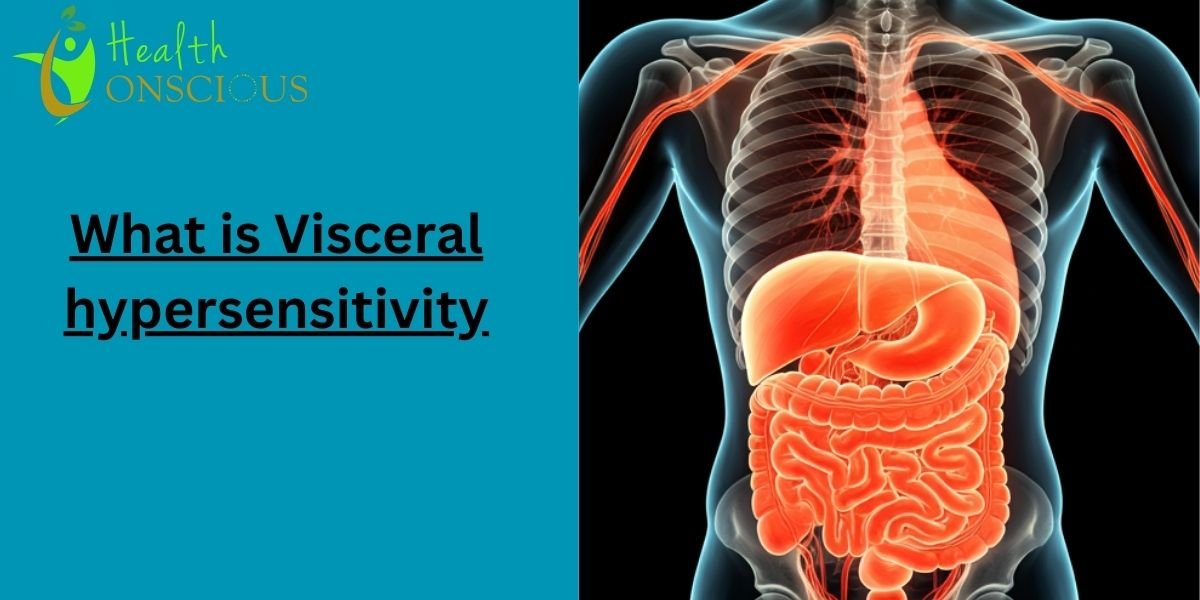What is Visceral Hypersensitivity? The complicated disorder impacts the nerves that transmit sensation in the internal organs. By sending messages to the brain, these nerves enable us to experience feelings like pressure, discomfort, and fullness. When a person has visceral hypersensitivity, their nerves become too sensitive and overreact to everyday events.
The brain can therefore view even subtle or harmless feelings as unpleasant or painful. Because it can result in ongoing pain and discomfort, visceral hypersensitivity can significantly affect a person’s quality of life. Understanding the elements contributing to this illness’s development is critical for proper management and treatment.
Definition and Overview
What is Visceral Hypersensitivity? It is a condition that affects the nerves transmitting sensation in the internal organs, increasing one’s experience of everyday feelings. The brain receives messages from sensory nerves lining the internal organs, including the bladder, intestines, and stomach. People with visceral hypersensitivity have hypersensitized nerves, causing them to send inflated messages to the brain.
Even when there is no real harm or injury to the organs, the brain interprets these increased signals as pain or discomfort. This heightened awareness of everyday experiences can greatly impact a person’s daily life, leading to a variety of symptoms.
Common Symptoms
Due to their elevated pain response, people with visceral hypersensitivity frequently have a variety of symptoms. Each person may experience these symptoms differently.
- Abdominal pain or discomfort: One of the most typical signs of visceral hypersensitivity is abdominal pain or discomfort. The pain may be continuous or irregular, and it might vary in intensity.
- Bloating or distention: Bloating or a feeling of fullness in the stomach is common in people with visceral hypersensitivity. Abdominal distention or apparent swelling may accompany this.
- Increased sensitivity to pressure or fullness: People who have visceral hypersensitivity may experience pain or discomfort when their tummy is compressed, as can happen when they wear tight clothes or when their stomach is full after eating.
- Modified bowel movements: Visceral hypersensitivity may impact the digestive system’s regular operation, resulting in modifications to stool movements. While some people may have constipation, others may have regular episodes of diarrhea.
- Vomiting or feeling queasy: Visceral hypersensitivity may occasionally result in vomiting or nausea.
What is Visceral Hypersensitivity? It’s crucial to remember that each person may experience symptoms of this condition differently in terms of frequency and intensity. While some people may only occasionally suffer from moderate symptoms, others may frequently experience more severe symptoms that significantly impact their day-to-day activities.
Often, doctors manage and treat visceral hypersensitivity using an integrated strategy that includes dietary adjustments, medication, and lifestyle changes. To create a customized treatment plan that meets their unique requirements and symptoms, people with this illness should collaborate closely with their medical professionals.
What Causes Visceral Hypersensitivity?
Understanding the underlying causes of visceral hypersensitivity can improve effective therapy and management techniques. Although the exact cause of this illness is still unknown, experts have found several potential contributing variables.
There are several reasons for visceral hypersensitivity, a eating disorder marked by increased sensitivity and perception of pain in the internal organs. Two major variables that contribute to the development of this illness are environmental triggers and genetics factors.
Genetic Factors
Research suggests that genetic factors may cause individuals to develop visceral hypersensitivity. Increased sensitivity and pain perception can result from certain genetic variants that impact sensory nerve function.
Furthermore, visceral hypersensitivity may be more likely to develop in those with a family history of digestive diseases, such as irritable bowel syndrome (IBS). Environmental variables and a family history further complicate the development of this illness.
Environmental Triggers
Stress, trauma, and certain meals are examples of environmental variables that can cause or worsen visceral hypersensitivity. Research has shown that stress specifically modifies the gut’s nerve sensitivity, thereby intensifying pain perception.
Furthermore, visceral hypersensitivity may be more likely to develop in people who are recovering from mental or physical stress. Traumatic experiences can disrupt the regular operation of the nervous system, leading to increased sensitivity and altered pain perception.
What is Visceral Hypersensitivity? This condition can occur due to various factors, including nutritional variables, stress, and trauma. For instance, eating meals high in fat or fiber can increase the gut’s inflammatory response, making it more sensitive and painful. Additionally, certain food allergies or intolerances can trigger an immune response in the stomach, which exacerbates visceral hypersensitivity symptoms.
It’s important to remember that different people may have different causes of visceral hypersensitivity. Although environmental triggers and genetic factors frequently contribute, the relationship between these elements and individual vulnerability is complex and multifaceted.
By understanding the fundamental causes of visceral hypersensitivity, medical practitioners can develop customized treatment programs that target each patient’s unique triggers and contributing factors. With a comprehensive approach—incorporating medication, lifestyle modifications, and psychological support—individuals with visceral hypersensitivity can find relief and improve their quality of life.
Diagnosing Hypersensitivity
In study models, a rectal barostat measures visceral pain. Simply put, researchers place a balloon in the rectum and fill it with varying pressures and volumes. Throughout the process, participants record their feelings. People who experience visceral discomfort say they are more conscious of little balloons.
Do not be concerned. If you anticipate experiencing visceral pain, it is unlikely that you will receive a rectal barostat. Based on clinical experience, patient presentation, and checking out alternative diseases, the majority of doctors make the diagnosis of visceral hypersensitivity.
Note that visceral discomfort does not only occur in the rectum. Throughout the whole digestive system, but especially in the small and large intestines, people with irritable bowel syndrome may feel more sensations and have lower pain thresholds.
Managing Visceral Hypersensitivity and IBS
The good news is that you may reduce visceral hypersensitivity and calm down the fight-or-flight response by implementing several easy lifestyle adjustments and techniques. By reprogramming the communication between the stomach and the brain, lowering stress and anxiety, and minimizing stimulation that activates the gut nerves, these techniques aim to quiet down the nervous system. Try the following tactics:
Gut-Focused Hypnotherapy: This mind-body treatment helps control gut function and reduce feelings of pain by using guided relaxation and suggestion. According to studies, hypnotherapy may successfully reduce the symptoms of IBS, including discomfort, diarrhea, and bloating. The Nerva App is a well-known tool.
Mindfulness: Stress is a key cause of IBS flare-ups, and mindfulness techniques like breathing exercises, guided body scans, and meditation can help control it. By promoting a better connection between the stomach and the brain through the relaxation of the nervous system, mindfulness can reduce gut sensitivity and improve symptoms. It’s not necessary to set aside a certain period in your day to engage in mindfulness exercises; you may listen to guided sessions while doing the dishes, doing laundry, taking a shower, or getting ready for bed. There are many free mindfulness resources available on YouTube, and mindfulness applications like Headspace or Calm are excellent tools.
Cognitive behavioral therapy (CBT): CBT helps in recognizing and altering harmful thinking patterns that may exacerbate symptoms of IBS. You can reduce the gut’s response to stress by learning to redefine unpleasant experiences.
Frequent exercise: Exercise lowers stress hormones and supports a digestive health system, which helps relieve IBS symptoms overall. If you have trouble exercising regularly, try to walk for ten to fifteen minutes each day, or break it up into five-minute bursts a few times a day.
Yoga: This method uses two different approaches to treat IBS. First, yoga’s thoughtful movements and deep breathing help your body transition from fight-or-flight to rest and digest mode. Second, by gently massaging and stimulating the digestive organs, several yoga positions can improve digestion and reduce bloating, trapped gas, and pain. For some free options you may use at home, try searching YouTube for “Yoga for IBS.”
Dietary Adjustments: A variety of factors may contribute to the symptoms of IBS. Reducing food cues can allow your stomach to relax while you use other techniques to rewire the brain-gut connection. You can determine which foods are causing your symptoms by following the low-FODMAPS diet. We can walk you through the entire process with our FODMAP Made Easy program.
Enhancing your sleep: Have you ever noticed that experiencing sleep deprivation makes everything more challenging? It is more difficult to control your emotions, noises are more annoying, and toe-stripping hurts more. This is because sleep impacts the gut and brain systems. Your body is better able to control digestion and handle stress when you get enough sleep. It might be beneficial to establish regular nighttime eating habits, enhance your sleeping environment, and wind down before bed.
Giving your body reassurance: Normal digestion involves some bloating, a gastric journey, and even a chatty stomach. We need to reassure the body that it is experiencing a normal and healthy digestive reaction. For instance, you may unintentionally trigger the symptom loop if you hear your stomach growl and then begin to worry that you could have symptoms later. Say to yourself, “I hear your stomach; thanks for digestion, my food,” the next time you hear your stomach growl. Once your body finds comfort, continue with your day without excessive concern for your gut health actions.
Getting rid of the tight clothes: Slender jeans, figure-hugging workout clothes, and tight belts can all increase abdominal pressure, increasing bloating and discomfort. This increased pressure may activate your gut nerves, making you more sensitive to sensations in and around your gut. On the other hand, choose more comfortable, loose-fitting apparel.
Making time for enjoyable activities: Depleting your self-care resources can make it difficult to take care of yourself and control symptoms. Make an effort to select a few mental-boosting activities each week. These activities might be anything that brings you a few moments of happiness, such as reading a book, having a cup of tea, visiting a new place, or conversing with a friend.
Addressing home stresses: Now is the time to address issues such as an overflowing plastic container cupboard that inexplicably causes you stress or a messy kitchen bench that overwhelms you. These constant stresses, despite their seemingly insignificant nature, always activate your nervous system. Creating a quiet environment at home might help your gut feel more at ease.
Last Wordings
What is Visceral Hypersensitivity? Between one-third and 90% of people with irritable bowel syndrome experience visceral discomfort, which is a characteristic of the condition. Thankfully, patients don’t have to bear their suffering in silence. We are still investigating the possible reasons for this difficult illness. We will continue to progress in creating and suggesting efficient therapies as we identify the underlying causes.
If you believe that visceral discomfort contributes to your IBS symptoms, I strongly advise you to find a medical team that is knowledgeable about abdominal pain and sensitivity. Talking to your GI doctor and seeing their response is one way to handle this. Would they be open to discussing it? Do they collaborate with or refer to a group of experts (such as a nutritionist or therapist)? Together, you will develop a strategy that suits your needs.


